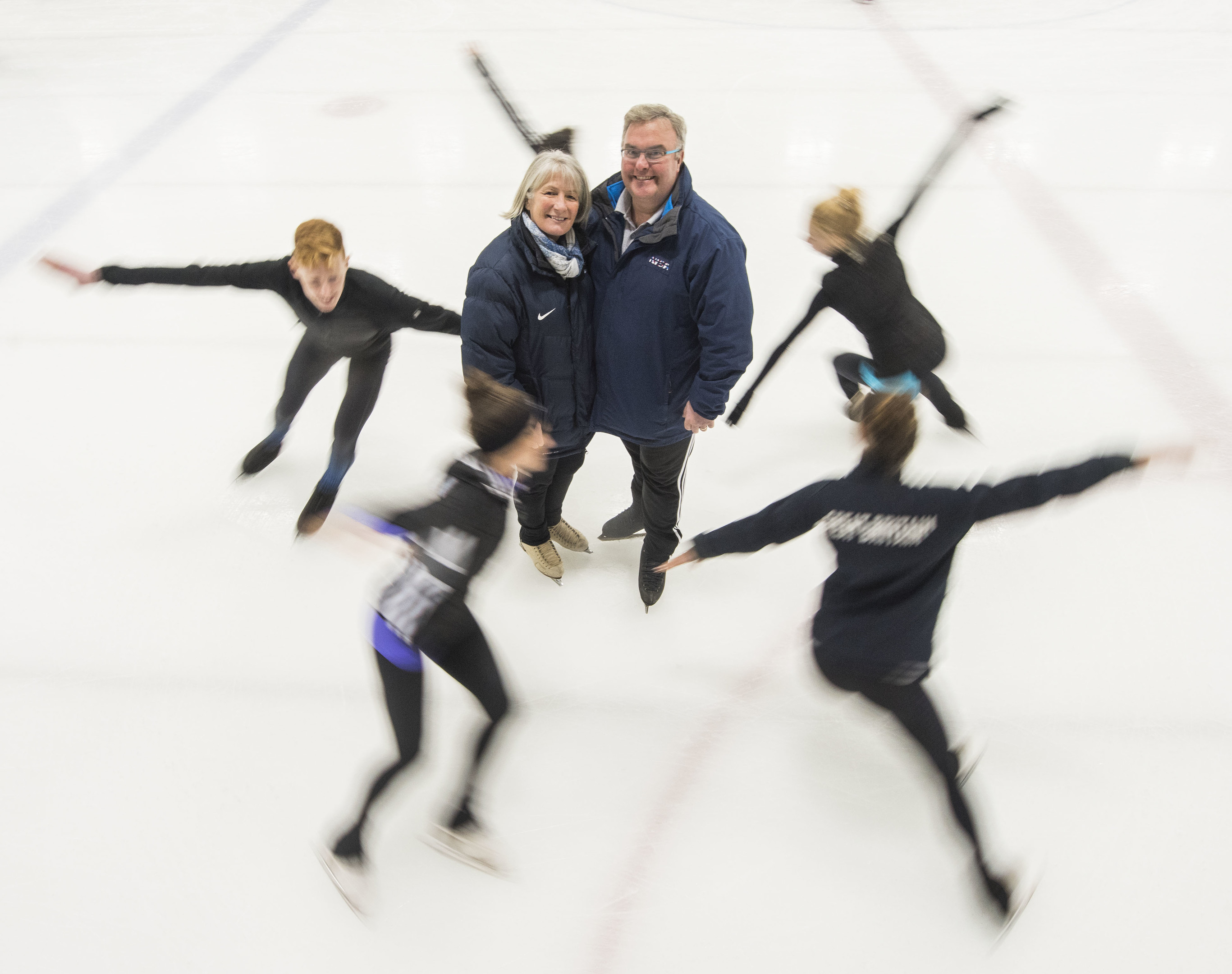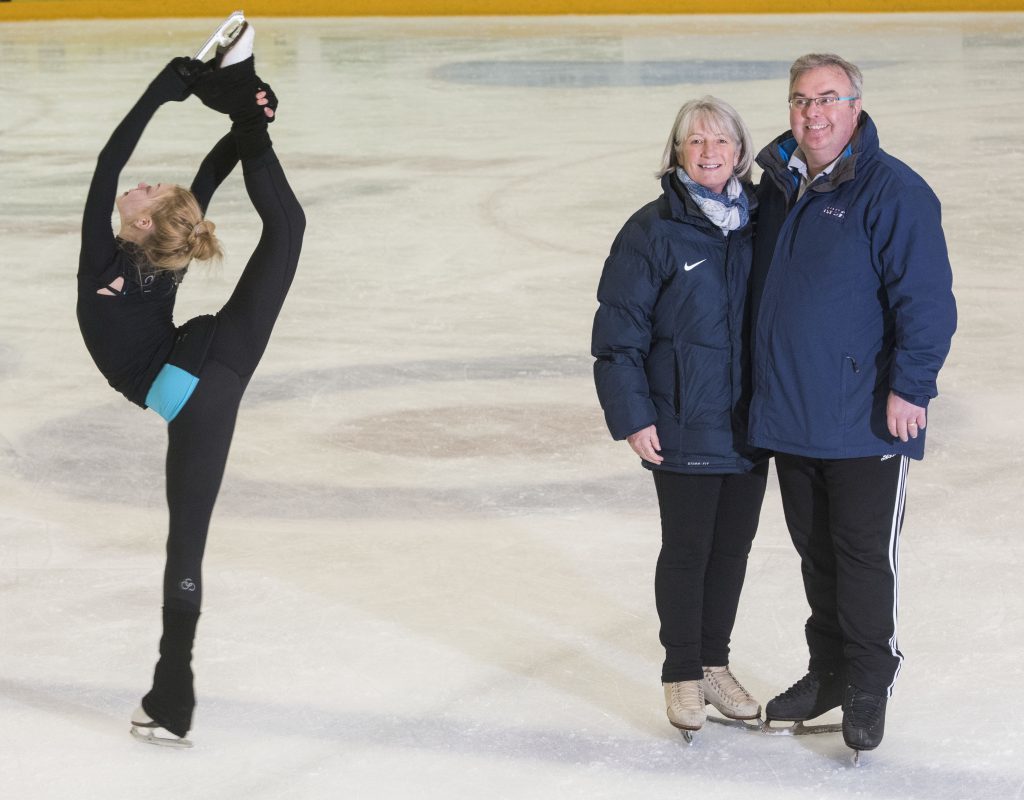
IT is 11am on a stormy morning. Given the choice, most people would probably rather be curled up at home with a book.
For a group of enthusiasts, though, there’s only one place to be – dancing on ice.
On the rink at the Dundee Ice Arena, there’s a lot of gliding, giggling and banter. Now and then, the odd fall here and there.
In a room upstairs, a group is doing Pilates. They’re very bendy.
These are the elite skaters, who compete all over the world. They’ve been here since 6am. They’ll be finished by lunchtime – then back for more training in the evening.
The heart and soul of the rink are Debi and Simon Briggs.
They coach the elite figure skaters and travel the world with them. Debi is just back from Moscow and Simon from Europe.
But they are equally happy teaching a group of five to 85-year-olds, who have never been near an ice rink, to skate.
On meeting Debi and Simon, they’ll tell you there are a lot of elite athletes who train at the arena because of the facilities.
Some elite skaters have even chosen to move to the area.
But the real reason there’s such a successful group of skaters who are here is Debi and Simon themselves.
They’re a magnet for ice-skating talent and they’ve turned Dundee into a figure skating powerhouse.
Simon was part of Jenna McCorkell’s coaching team. She won 11 British championships and competed at the Olympics.
They currently train four of six of the UK’s top women skaters.
“They’re friends off the ice. But they are rivals once they step on to the rink,” says Debi.
Their stars include Natasha McKay, who’s 23 and from Dundee.
A few years ago, Natasha was in the doldrums, not being selected for teams.
But, with the help of Debi and Simon – and a lot of hard work – she’s won the British Women’s Figure Skating Championship two years running.
The day after I speak to her, she’s selected for Great Britain’s team for the forthcoming World Championships.
Karly Robertson, who the Briggs also coach, is selected as reserve.
Simon and Debi are delighted. But it comes at huge cost to the skaters and their families.
“Our sport is amateur. Natasha’s next competition is in Holland,” Simon says. “She has to pay her entry fee, her flight and accommodation and her coach’s flight and accommodation.
“To compete costs the best part of £1500. She’s representing Great Britain and yet she’s working in a shop to fund herself.”
They talk about the impact Dancing On Ice has had.
Since the programme returned, there’s been a huge increase in the number of people turning up to the Learn To Skate programme.
“Dancing On Ice really makes a difference. We had 60 new people turn up last Sunday alone,” Debi laughs.
“We have to be ready for it. All those novices hanging on to the barrier!”
It’s probably no surprise to learn the pair are fans of the programme, although they do point out it’s a different style of ice skating – they teach figure skating, whereas the programme concentrates on ice dancing.
“I like it, it’s good entertainment,” Debi, 57, says. “They’re not great skaters, but it’s fun and it’s good for ice skating.
“The more people we can get coming along, the better.”
They’ve had many proud moments along the way.
“Seeing skaters you’ve coached winning competitions is special and being at the Olympics was amazing” says Debi, who coached at the 1992 Olympics in France.
“But sometimes it’s the smaller things. If you’re coaching little ones and they’re struggling, it’s satisfying to get them to focus on one small thing and watch it all come together, because all the little things add up.”
Simon, 46, agrees, but for him it was all about the 2014 Winter Olympics in Russia.
“Coaching there was an unforgettable experience,” he says.
“I loved it. But I also used to coach a little girl, Victoria. She had cancer. She came to the rink for three or four years and really got a lot out of it.
“I still get messages from her now. I still see her mum out and about and she’s straight over to speak to me when we meet. I think they appreciated it and really enjoyed it. It was great to be able to help.”
Fancy giving ice skating a go? According to the Briggs, you are never too old, even though Simon points out it’s harder work than most people realise.
“We’ve got pensioners who come along,” says Debi.
“We had one lady, Ruby, who was 80 years old.
“Another, Don, was in his 80s. His 90th birthday is coming up – and he’s determined to be on the ice with four generations of his family for a photograph.”
Who’s their tip to win Dancing On Ice?
“Hard to say, but I think Max Evans is really good,” says Debi.
“For me, Donna Air,” says Simon.
And then they’re off, back on to the ice where they feel most at home.

Enjoy the convenience of having The Sunday Post delivered as a digital ePaper straight to your smartphone, tablet or computer.
Subscribe for only £5.49 a month and enjoy all the benefits of the printed paper as a digital replica.
Subscribe